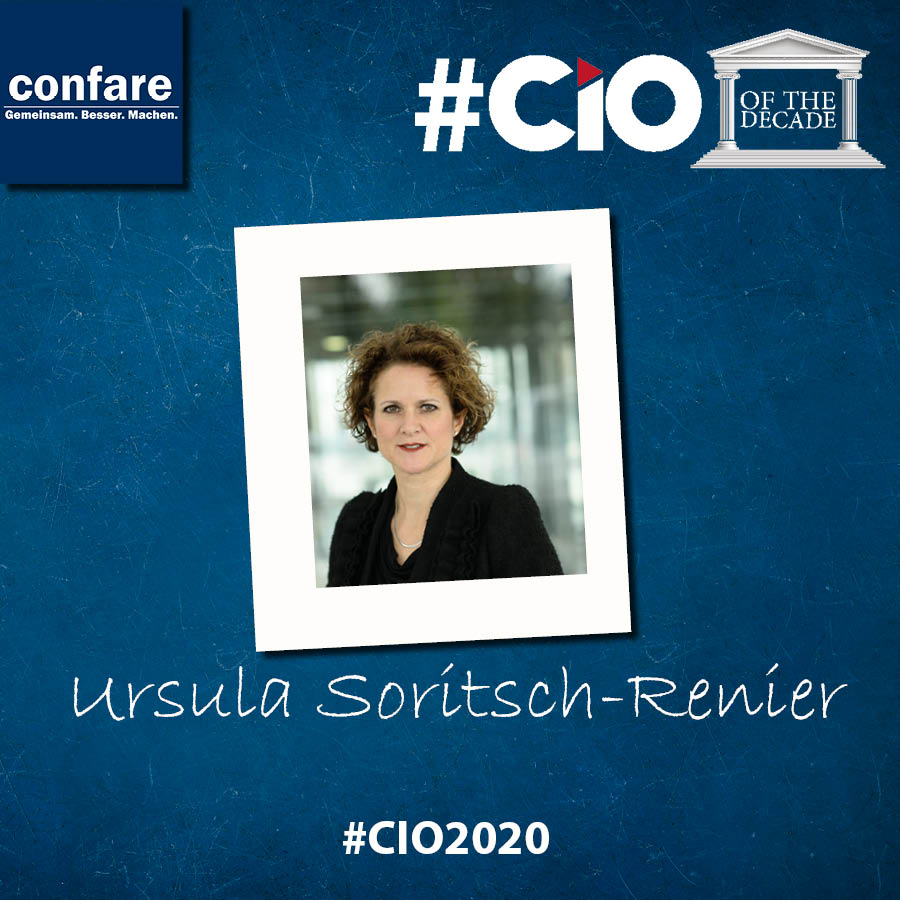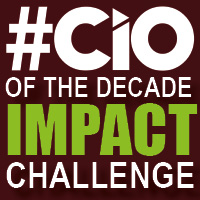Über 220 CIOs und Top IT-Manager (m/w) aus dem DACH-Raum sind im Rennen um die prestigeträchtige Auszeichnung CIO OF THE DECADE. Eine Initiative von Confare und EY in Zusammenarbeit mit Superevent.
In dieser Blog-Reihe stellen wir unterschiedliche Persönlichkeiten vor, die für den Award nominiert sind.
Ursula Soritsch-Renier
Group CIO and Digital Leader, Nokia
Bisherige Stationen:
– Mentor, Technology Management – Master Programm
– Advisory Board Member, HWZ University of Applied Sciences in Business Administration Zürich
– CIO and Group Digital Leader IT, Sulzer
– Global Head IT Strategy, PMO and Architecture
– Mehrere Funktionen bei Phillips
What are the most important factors for success as a CIO?
Soritsch-Renier: Foremost it is about people: you need to surround yourself with the best possible leaders and hire people that are smarter than you. Then, you need to establish a sound IT strategy that enables the success of the company and be extremely rigorous in its execution at every step of the way.
In your opinion, what are the most important tasks of the CIO? Have these changed in the last decade?
Soritsch-Renier: In my opinion, the fundamentals haven’t really changed . IT should always be about forward–looking with a holistic perspective of people, process and technology – it never was and shouldn’t be about pushing technology. The understanding of business needs, getting your leadership team and people to execute the strategy, finding the right suppliers. and coordinating these 3 the best possible way by managing business expectations – those are for me the most important tasks. Apart from the fundamentals, I see that the demand for agility and speed is ever increasing so one must really focus on what is moving the needle next.
Confare #CIO of the Decade
IMPACT CHALLENGE
Bis 1. April 2021 nehmen wir Ihre Nominierungen und Einreichnungen entgegen
JETZT MITMACHEN!
How do you see the tension between business and IT? Has the relationship changed?
Soritsch-Renier: I see IT as a true business partner. IT should not consider the business as some kind of “internal customer” with orders that IT has to fulfil. We first have the responsibility to make all systems easily integrable and maintainable and to keep our technology portfolio controlled and secured. The business and IT each have their own expertise and accountability in the enterprise: and together we find the best solution for the company. For me this is the foundation for a good cooperation that I apply in all my CIO jobs. Business and IT working as one team with the objective to make the company successful, always was/should have and is the nature of IT while making an impact .
What do you see as your greatest achievements in the last 10 years?
Soritsch-Renier: It is the journey I had with Sulzer. I started with a decentralized IT and created a strong delivery and co-creation function for the business. After stabilizing and leapfrogging the infrastructure and parts of the application domain, IT was the team that developed a pump optimization software that enabled this 153 year old manufacturing company to become a software vendor and grow its business in repair services and in spare parts, retrofits and new pump sale.
At this moment I am transforming Nokia to increase dramatically their business efficiency, innovate in the go-to-market interface to the customer as well as push the digitalization agenda so that Nokia will become an AI driven company. The first results are in after a year and it does look promising ahead.
How do you shape the role as a leader and talent manager?
Soritsch-Renier: I think it’s about putting the people working with you in the best positions possible for them to be successful. A leader has to be a driving force that relentlessly engages with the teams globally. You need to get people to understand and embrace your strategy and co-drive it with you. It may mean that you have to turn the pyramid upside: be in support of the team to get whatever hurdles they face out of the way. From a talent management perspective, you need to empower people to do what they know to do. Don’t be a bottleneck and provide them with opportunities to bring themselves in and fully apply their expertise. Talking clear text with the business and role modeling the attitude and behaviors that you expect from your team are also key to successful leadership.
What skills should you bring to a CIO career?
- Be business savvy: understand how you can contribute to the success of your company
- Be technically competent and keep this competence alive all your career with continuous learning.
- Build a vision for IT and be a strong communicator so people follow you
- Surround yourself with best talents : hire people smarter than you
- Be persistent and rigorous : execute step by step
What does the CIO OF THE DECADE award mean for you personally?
Awards are something very special for corporate functions because they are usually being put under the spotlight only when something goes wrong. It’s very rare that you get recognized and celebrated from doing the right things. An award like the CIO of the Decade is very important because it brings to light what often remains in the shadows. Such an award is not about one person – it is always a team award. There’s always a great team behind a great CIO.




